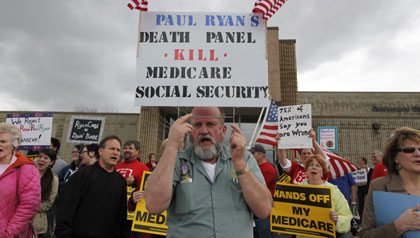AARP Hearing Center


The future of Medicare has again become a political hot potato in light of a Republican plan to dismantle the government-run program and replace it with a voucher system that experts say would shift more costs to beneficiaries. The proposal is the most controversial item on the agenda as White House and congressional leaders met Thursday to start hammering out a compromise plan for reducing the national deficit.
Under the plan, drawn up by House Budget Committee Chairman Paul Ryan (R-Wis.) and adopted by the House in mid-April, future Medicare enrollees now younger than 55 would no longer receive guaranteed benefits. Instead, the government would provide a set amount of money to buy private insurance on their own.
The plan contains few details of how private vouchers would work — except that the payments would be geared to the rate of inflation as measured by the consumer price index, which is rising far slower than health care costs.
An analysis of the Ryan plan by the politically neutral Congressional Budget Office estimates that by 2030, typical 65-year-olds would pay 68 percent of the cost of their coverage out of pocket, compared with the 25 percent share they pay now. In dollar terms, the average 65-year-old's costs would more than double from about $6,000 a year under current law to $12,500 by 2022, and would be higher for older people.
In scenes reminiscent of reaction to the Democrats' health care reform proposals in 2009, angry older Americans confronted their members of Congress at recent town hall meetings — only this time it was Republicans who faced the firestorm. As a result, some Republicans in Congress seem to be distancing themselves from the plan. But Eric Cantor, House Republican leader, told Reuters that he will still press for the Ryan proposal in the budget negotiations.
Two out of three older people say they prefer to keep Medicare as it is now, according to several recent opinion polls — even though Ryan has made it clear that his proposal, if implemented, would not affect them. "Today's beneficiaries care deeply that Medicare will continue to provide adequate benefits for their children and grandchildren," says John Rother, AARP's director of policy.
Another motivation for current seniors' opposition may be that they don't trust the government to stick with the promised age cutoff. "I think there's a nervousness among seniors that if Congress ends Medicare as they know it for younger people, they could also decide to do away with it for everybody else," says Robert Blendon, professor of health policy and political analysis at Harvard University. "At a time of great economic insecurity among retirees, something that could dramatically change the program even for others sounds very threatening."
House approval came on a straight party vote with no Democrats and all but four Republicans voting in favor.

































































More From AARP
Couple Loses Health Coverage Over Pennies
Policy canceled for being 2 cents short in one payment.
New Legislation Seeks to Create A New Medicare Benefit
Congress is working on a new benefit for Medicare recipients: a transitional care benefit.